JOHN MILTON Paradise Lost Paradise Lost is an

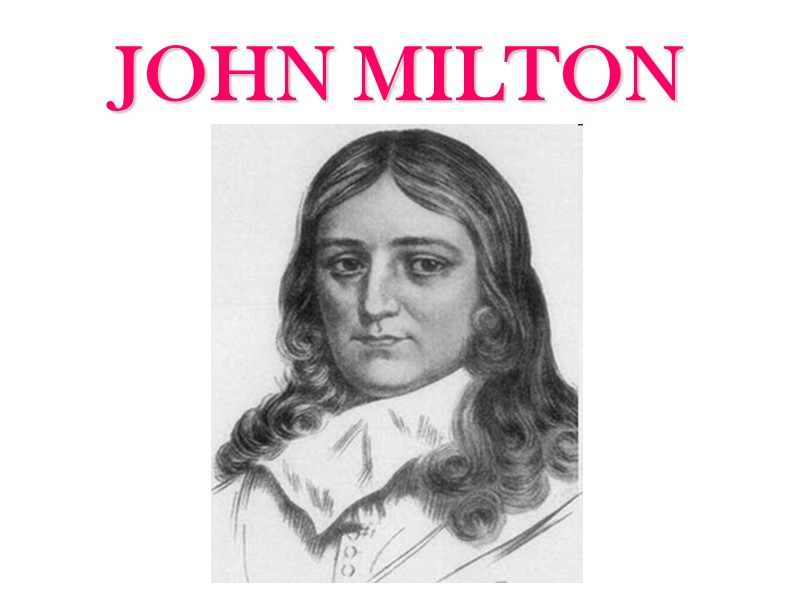
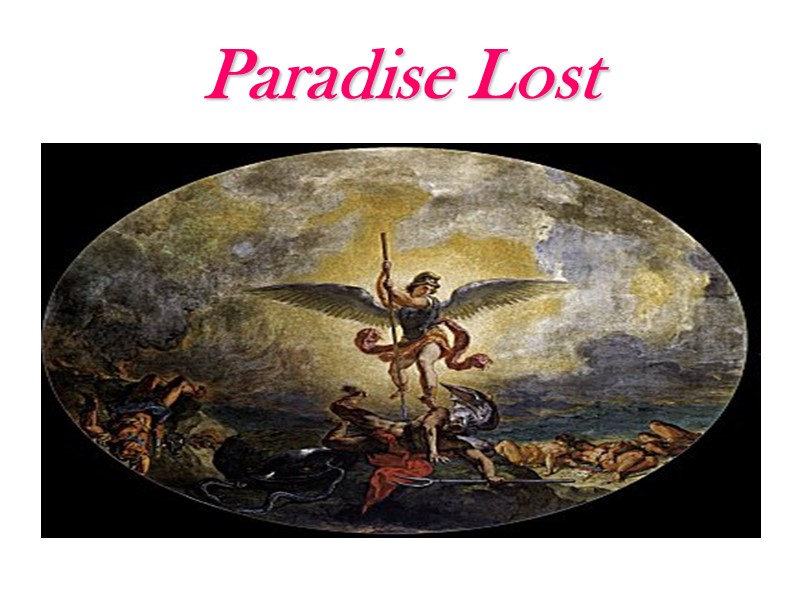
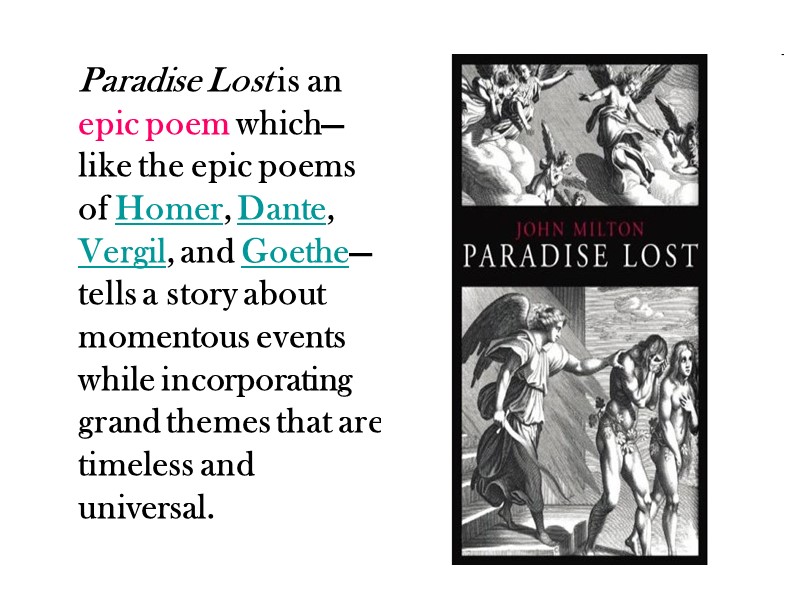
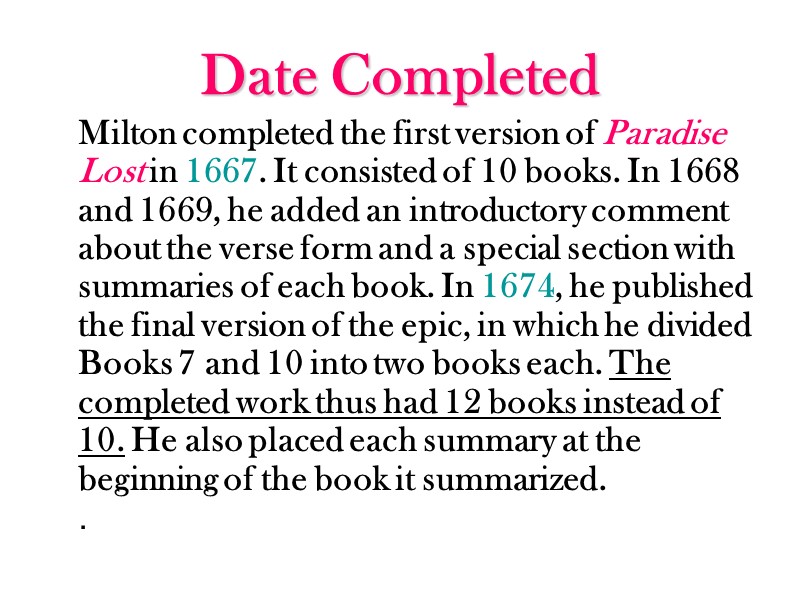
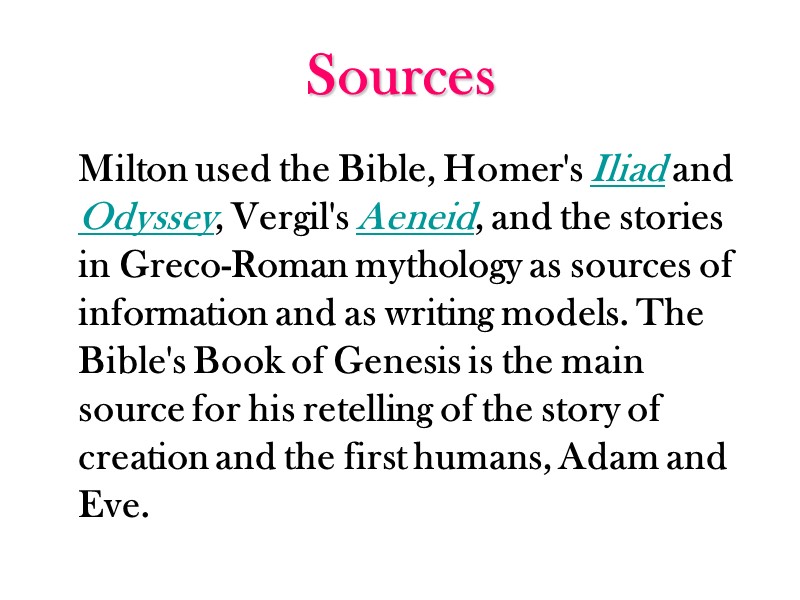
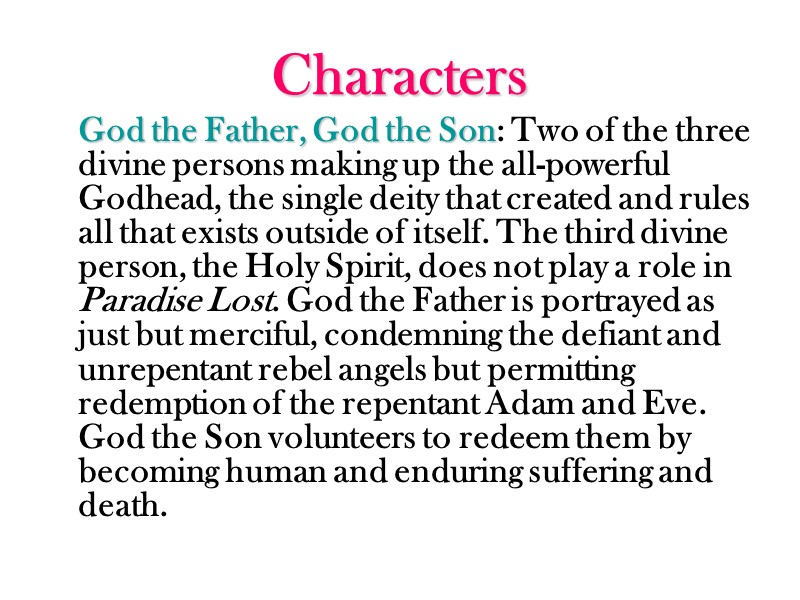
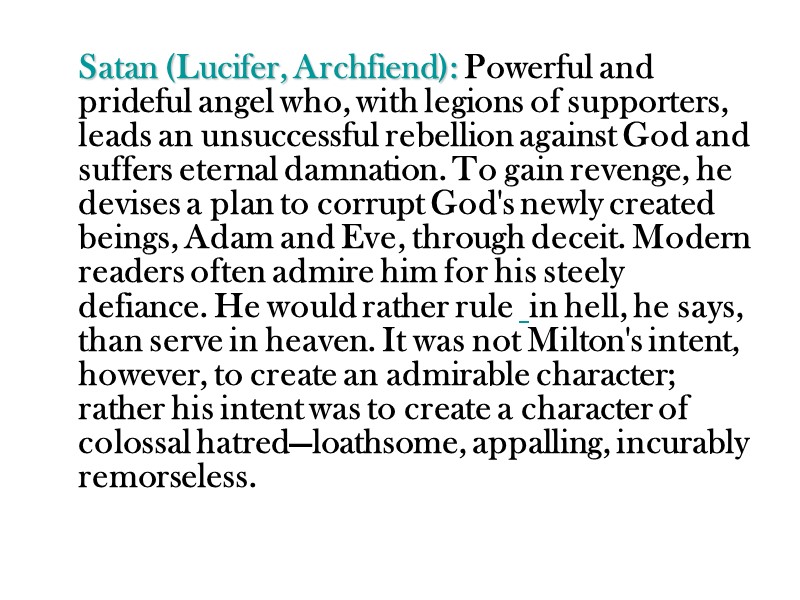
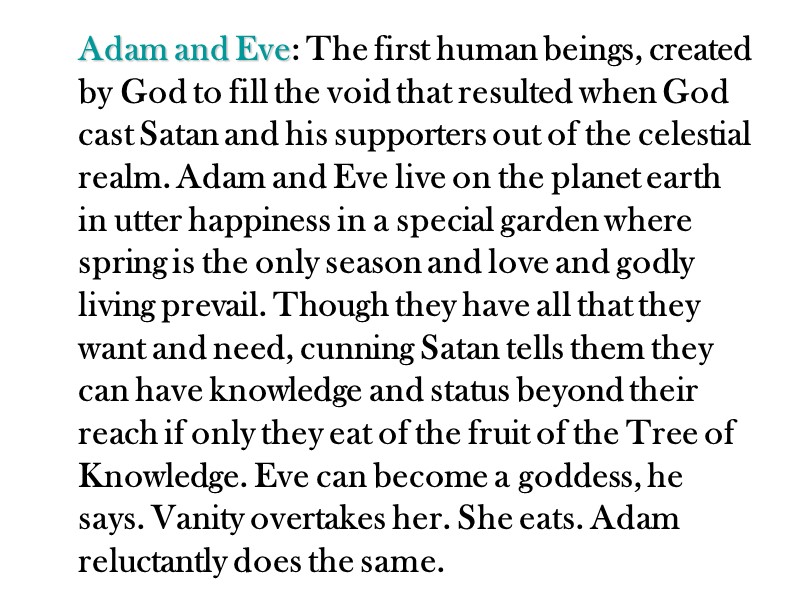
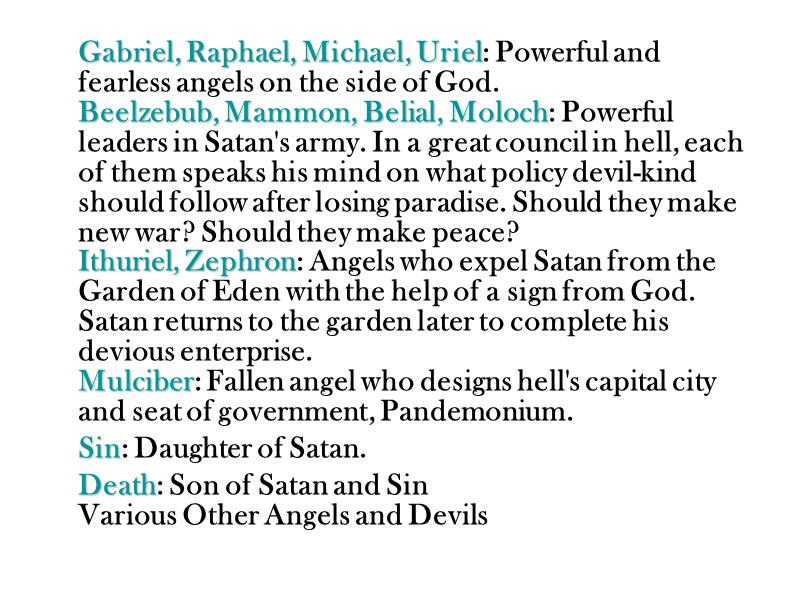
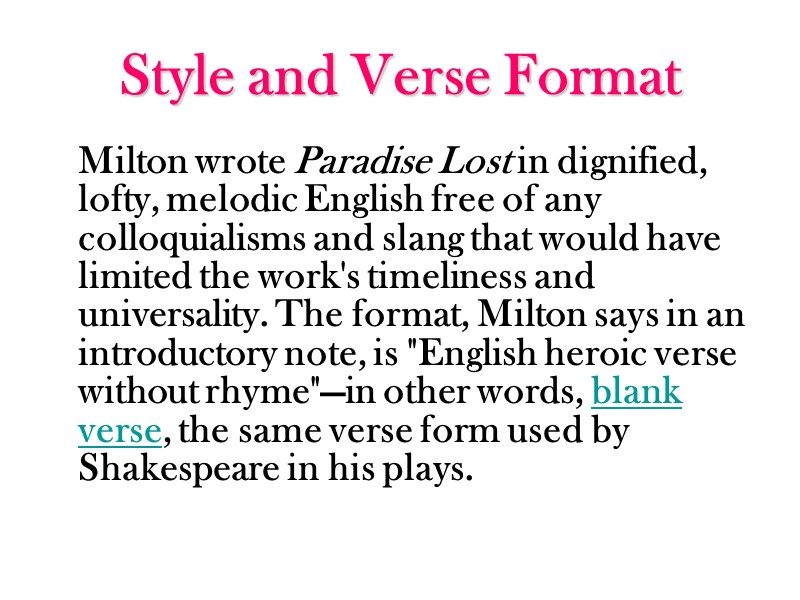
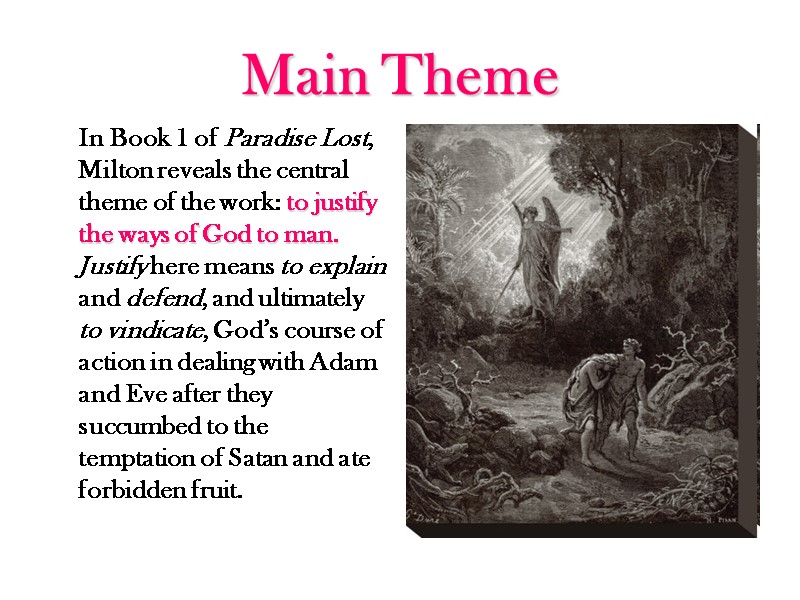
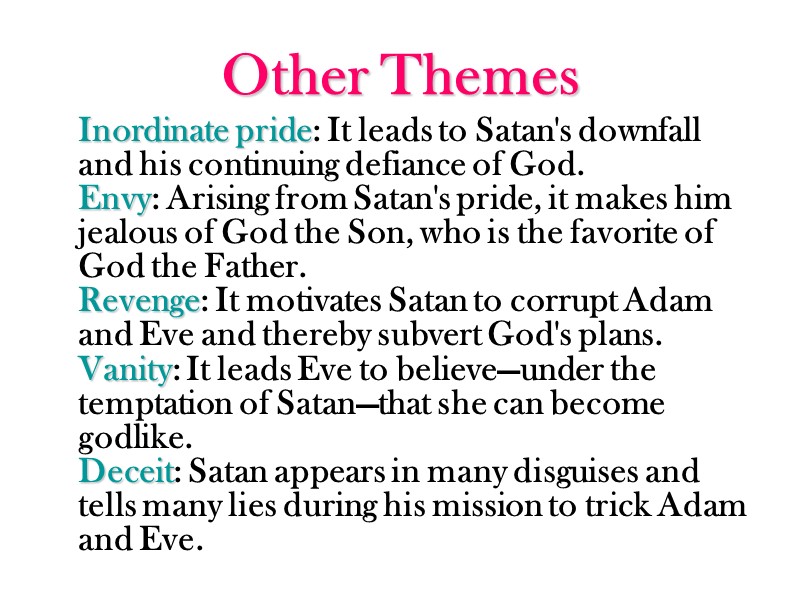
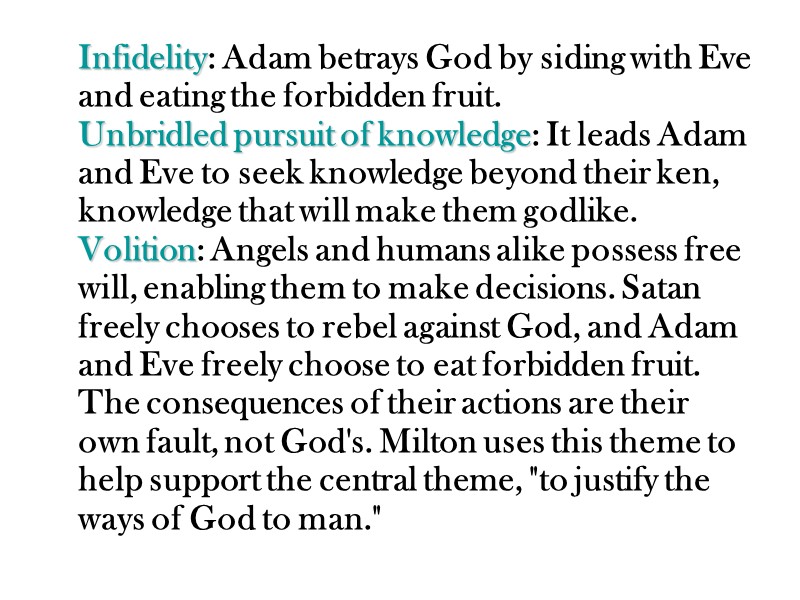
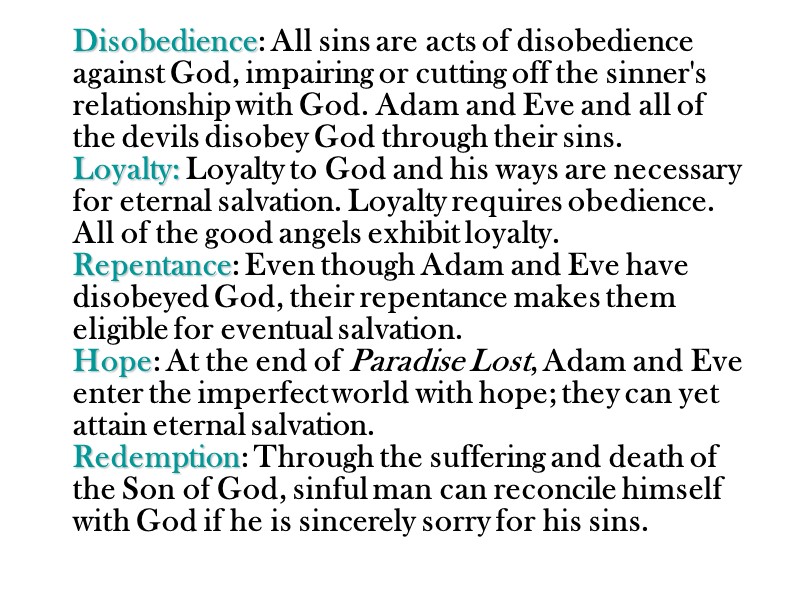
23664-lecture_8_john_milton.ppt
- Количество слайдов: 14
 JOHN MILTON
JOHN MILTON
 Paradise Lost
Paradise Lost
 Paradise Lost is an epic poem which—like the epic poems of Homer, Dante, Vergil, and Goethe—tells a story about momentous events while incorporating grand themes that are timeless and universal.
Paradise Lost is an epic poem which—like the epic poems of Homer, Dante, Vergil, and Goethe—tells a story about momentous events while incorporating grand themes that are timeless and universal.
 Date Completed Milton completed the first version of Paradise Lost in 1667. It consisted of 10 books. In 1668 and 1669, he added an introductory comment about the verse form and a special section with summaries of each book. In 1674, he published the final version of the epic, in which he divided Books 7 and 10 into two books each. The completed work thus had 12 books instead of 10. He also placed each summary at the beginning of the book it summarized. .
Date Completed Milton completed the first version of Paradise Lost in 1667. It consisted of 10 books. In 1668 and 1669, he added an introductory comment about the verse form and a special section with summaries of each book. In 1674, he published the final version of the epic, in which he divided Books 7 and 10 into two books each. The completed work thus had 12 books instead of 10. He also placed each summary at the beginning of the book it summarized. .
 Sources Milton used the Bible, Homer's Iliad and Odyssey, Vergil's Aeneid, and the stories in Greco-Roman mythology as sources of information and as writing models. The Bible's Book of Genesis is the main source for his retelling of the story of creation and the first humans, Adam and Eve.
Sources Milton used the Bible, Homer's Iliad and Odyssey, Vergil's Aeneid, and the stories in Greco-Roman mythology as sources of information and as writing models. The Bible's Book of Genesis is the main source for his retelling of the story of creation and the first humans, Adam and Eve.
 Characters God the Father, God the Son: Two of the three divine persons making up the all-powerful Godhead, the single deity that created and rules all that exists outside of itself. The third divine person, the Holy Spirit, does not play a role in Paradise Lost. God the Father is portrayed as just but merciful, condemning the defiant and unrepentant rebel angels but permitting redemption of the repentant Adam and Eve. God the Son volunteers to redeem them by becoming human and enduring suffering and death.
Characters God the Father, God the Son: Two of the three divine persons making up the all-powerful Godhead, the single deity that created and rules all that exists outside of itself. The third divine person, the Holy Spirit, does not play a role in Paradise Lost. God the Father is portrayed as just but merciful, condemning the defiant and unrepentant rebel angels but permitting redemption of the repentant Adam and Eve. God the Son volunteers to redeem them by becoming human and enduring suffering and death.
 Satan (Lucifer, Archfiend): Powerful and prideful angel who, with legions of supporters, leads an unsuccessful rebellion against God and suffers eternal damnation. To gain revenge, he devises a plan to corrupt God's newly created beings, Adam and Eve, through deceit. Modern readers often admire him for his steely defiance. He would rather rule in hell, he says, than serve in heaven. It was not Milton's intent, however, to create an admirable character; rather his intent was to create a character of colossal hatred—loathsome, appalling, incurably remorseless.
Satan (Lucifer, Archfiend): Powerful and prideful angel who, with legions of supporters, leads an unsuccessful rebellion against God and suffers eternal damnation. To gain revenge, he devises a plan to corrupt God's newly created beings, Adam and Eve, through deceit. Modern readers often admire him for his steely defiance. He would rather rule in hell, he says, than serve in heaven. It was not Milton's intent, however, to create an admirable character; rather his intent was to create a character of colossal hatred—loathsome, appalling, incurably remorseless.
 Adam and Eve: The first human beings, created by God to fill the void that resulted when God cast Satan and his supporters out of the celestial realm. Adam and Eve live on the planet earth in utter happiness in a special garden where spring is the only season and love and godly living prevail. Though they have all that they want and need, cunning Satan tells them they can have knowledge and status beyond their reach if only they eat of the fruit of the Tree of Knowledge. Eve can become a goddess, he says. Vanity overtakes her. She eats. Adam reluctantly does the same.
Adam and Eve: The first human beings, created by God to fill the void that resulted when God cast Satan and his supporters out of the celestial realm. Adam and Eve live on the planet earth in utter happiness in a special garden where spring is the only season and love and godly living prevail. Though they have all that they want and need, cunning Satan tells them they can have knowledge and status beyond their reach if only they eat of the fruit of the Tree of Knowledge. Eve can become a goddess, he says. Vanity overtakes her. She eats. Adam reluctantly does the same.
 Gabriel, Raphael, Michael, Uriel: Powerful and fearless angels on the side of God. Beelzebub, Mammon, Belial, Moloch: Powerful leaders in Satan's army. In a great council in hell, each of them speaks his mind on what policy devil-kind should follow after losing paradise. Should they make new war? Should they make peace? Ithuriel, Zephron: Angels who expel Satan from the Garden of Eden with the help of a sign from God. Satan returns to the garden later to complete his devious enterprise. Mulciber: Fallen angel who designs hell's capital city and seat of government, Pandemonium. Sin: Daughter of Satan. Death: Son of Satan and Sin Various Other Angels and Devils
Gabriel, Raphael, Michael, Uriel: Powerful and fearless angels on the side of God. Beelzebub, Mammon, Belial, Moloch: Powerful leaders in Satan's army. In a great council in hell, each of them speaks his mind on what policy devil-kind should follow after losing paradise. Should they make new war? Should they make peace? Ithuriel, Zephron: Angels who expel Satan from the Garden of Eden with the help of a sign from God. Satan returns to the garden later to complete his devious enterprise. Mulciber: Fallen angel who designs hell's capital city and seat of government, Pandemonium. Sin: Daughter of Satan. Death: Son of Satan and Sin Various Other Angels and Devils
 Style and Verse Format Milton wrote Paradise Lost in dignified, lofty, melodic English free of any colloquialisms and slang that would have limited the work's timeliness and universality. The format, Milton says in an introductory note, is "English heroic verse without rhyme"—in other words, blank verse, the same verse form used by Shakespeare in his plays.
Style and Verse Format Milton wrote Paradise Lost in dignified, lofty, melodic English free of any colloquialisms and slang that would have limited the work's timeliness and universality. The format, Milton says in an introductory note, is "English heroic verse without rhyme"—in other words, blank verse, the same verse form used by Shakespeare in his plays.
 Main Theme In Book 1 of Paradise Lost, Milton reveals the central theme of the work: to justify the ways of God to man. Justify here means to explain and defend, and ultimately to vindicate, God’s course of action in dealing with Adam and Eve after they succumbed to the temptation of Satan and ate forbidden fruit.
Main Theme In Book 1 of Paradise Lost, Milton reveals the central theme of the work: to justify the ways of God to man. Justify here means to explain and defend, and ultimately to vindicate, God’s course of action in dealing with Adam and Eve after they succumbed to the temptation of Satan and ate forbidden fruit.
 Other Themes Inordinate pride: It leads to Satan's downfall and his continuing defiance of God. Envy: Arising from Satan's pride, it makes him jealous of God the Son, who is the favorite of God the Father. Revenge: It motivates Satan to corrupt Adam and Eve and thereby subvert God's plans. Vanity: It leads Eve to believe—under the temptation of Satan—that she can become godlike. Deceit: Satan appears in many disguises and tells many lies during his mission to trick Adam and Eve.
Other Themes Inordinate pride: It leads to Satan's downfall and his continuing defiance of God. Envy: Arising from Satan's pride, it makes him jealous of God the Son, who is the favorite of God the Father. Revenge: It motivates Satan to corrupt Adam and Eve and thereby subvert God's plans. Vanity: It leads Eve to believe—under the temptation of Satan—that she can become godlike. Deceit: Satan appears in many disguises and tells many lies during his mission to trick Adam and Eve.
 Infidelity: Adam betrays God by siding with Eve and eating the forbidden fruit. Unbridled pursuit of knowledge: It leads Adam and Eve to seek knowledge beyond their ken, knowledge that will make them godlike. Volition: Angels and humans alike possess free will, enabling them to make decisions. Satan freely chooses to rebel against God, and Adam and Eve freely choose to eat forbidden fruit. The consequences of their actions are their own fault, not God's. Milton uses this theme to help support the central theme, "to justify the ways of God to man."
Infidelity: Adam betrays God by siding with Eve and eating the forbidden fruit. Unbridled pursuit of knowledge: It leads Adam and Eve to seek knowledge beyond their ken, knowledge that will make them godlike. Volition: Angels and humans alike possess free will, enabling them to make decisions. Satan freely chooses to rebel against God, and Adam and Eve freely choose to eat forbidden fruit. The consequences of their actions are their own fault, not God's. Milton uses this theme to help support the central theme, "to justify the ways of God to man."
 Disobedience: All sins are acts of disobedience against God, impairing or cutting off the sinner's relationship with God. Adam and Eve and all of the devils disobey God through their sins. Loyalty: Loyalty to God and his ways are necessary for eternal salvation. Loyalty requires obedience. All of the good angels exhibit loyalty. Repentance: Even though Adam and Eve have disobeyed God, their repentance makes them eligible for eventual salvation. Hope: At the end of Paradise Lost, Adam and Eve enter the imperfect world with hope; they can yet attain eternal salvation. Redemption: Through the suffering and death of the Son of God, sinful man can reconcile himself with God if he is sincerely sorry for his sins.
Disobedience: All sins are acts of disobedience against God, impairing or cutting off the sinner's relationship with God. Adam and Eve and all of the devils disobey God through their sins. Loyalty: Loyalty to God and his ways are necessary for eternal salvation. Loyalty requires obedience. All of the good angels exhibit loyalty. Repentance: Even though Adam and Eve have disobeyed God, their repentance makes them eligible for eventual salvation. Hope: At the end of Paradise Lost, Adam and Eve enter the imperfect world with hope; they can yet attain eternal salvation. Redemption: Through the suffering and death of the Son of God, sinful man can reconcile himself with God if he is sincerely sorry for his sins.

